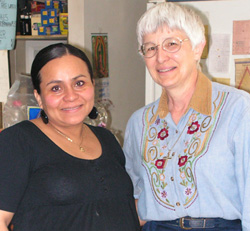Janice Thome, OP (Peace)
Roserita Weber, OP (Peace)
Ministry of Presence
Garden City, Kansas
 The Ministry of Presence, founded in 1978, is a direct ministry with the economic poor. Here, two Dominican Sisters of Peace listen to the struggles of the poor and help where they are able and celebrate each success no matter how small.
The Ministry of Presence, founded in 1978, is a direct ministry with the economic poor. Here, two Dominican Sisters of Peace listen to the struggles of the poor and help where they are able and celebrate each success no matter how small.
Sister Janice Thome, OP, mentors women in isolated and abusive or formerly abusive situations. She visits with them in the home and assists them in handling their mail, bills, getting to medical appointments, etc. Sister Roserita Weber, OP, teaches the information in the drivers’ handbook helping people in groups or individually. She then provides transportation to the written test. With permit in hand, she practices driving with them until they are ready for their driving test. This takes anywhere from four to 30 or more hours of practice. She also empowers women who are illiterate and unable to study on their own. As the self esteem of these women grow, the family becomes healthier as a result.
The Ministry of Presence utilizes available resources and creates resources where none exist. The sisters provide transportation to health appointments for families who do not have vehicles and/or cannot drive. Transportation is also provided for out of town specialty medical serves for families whose cars are not dependable for longer distances or at highway speeds. Through the service of transportation children are able to go to specialty clinics in Wichita, Kansas (more than 100 miles away) to receive treatment for a variety of ailments including cancer treatment, surgeries for cleft palates, treatment for shaken baby syndrome and obtaining prosthesis and wheelchairs, just to name a few.
As the ministry name implies, the sisters are present with the various families they serve extending a welcoming hand of help. The sisters respond to families in need that are referred to them by agencies, other ministries and nonprofits or simply from other people/families. The sisters identify those who are unable to access resources on their own and then start with a simple presence with each family, listening to their struggles and needs and determining how to best help them, as they are able. They also act as liaisons between those in need and the already existing resources. This linkage gives the sisters a foundation for advocacy on behalf of the marginalized.
In addition to transportation service, the sisters have found that insufficient low-cost furniture exists, so the sisters pick up and deliver donated furniture including mattresses, which is a significant blessing to those sleeping on the floor. They have created and manage a garden for the poor and those without land, and negotiated with the Community Health Coalition to provide transportation for the poor and handicapped. They spend time reading/interpreting mail for families, and sisters assist in completing applications and maneuvering through telephone menus.
For families without a phone, the sisters make the calls. They attend city meetings with landlords to improve enforcement of housing codes for rentals and are present at the drivers’ license office, to lessen the subtle discrimination often encountered. The sisters also support women suffering from domestic violence that is often made worse by economic conditions and pressure.
Reflecting on the Resolution on Immigration Reform recently passed by the Dominican Leadership Conference, Sisters Janice and Roserita were immediately struck by how many examples of the needed reform they see concretely in the people they serve and their life situations. Their stories help to put human faces to the needs articulated in the resolution supporting comprehensive immigration reform that:
Provides a path to permanent residency for immigrants currently residing in the United States.
There are countless immigrants brought into our country by their parents when they were very young. They have grown up here and have no memory of their country of birth. Many are very capable and have done well in their education. In order to go to college, they need to be able to work to pay their way and qualify for scholarships. Even if their parents have the money to pay their way, they need to be able to work after they graduate. These young people want to be teachers, medical and law enforcement personnel. Many live in very under-served rural areas that would benefit greatly from this additional group of professionals.
Assures family unity for immigrant families.Diana had four surgeries to remove abnormal blood vessels growing behind her eye. As each time before her eye began to again protrude from its socket. The doctors in Mexico told the parents they could do no more, but possibly in the United States, doctors could help. Since it takes eight years at least to obtain visas for a family to enter the United States legally, her parents decided to come undocumented because she would die of a brain bleed long before that time. Diana was served by a specialist at KU medical center at no taxpayer expense (the doctor said he goes to poor countries yearly to help children for free, so why not do it for her here.). Diana and one of her sisters have married U.S. citizens. At this point, they and their children are in Mexico waiting out their appeal process. It could be 3-12 months that these families are separated. The husbands have to come back here to keep their jobs to support the family and the large expense of the immigration process.
Expands the number of visas available to respond fairly to the demands of applicants as well as the needs of the U.S. economy.Lupano obeyed all the regulations. He came into the United States in 1988 on a guest worker visa and work permit supplied by a meat-packing company that needed more workers. He became a resident, and in 1992 applied for his wife and youngest daughter to come to the United States. They finally were granted their visas in 2004, and came to live with him. After receiving his citizenship in 2006, he applied for his three adult children. His married daughter in Mexico just received her approval, but in her category, our government is currently granting visas for those whose applications were received in 1992. The wait seems eternal in this complicated and broken system.
Balances quantity of visas with our country’s need for additional workers in order to ensure that U.S. workers are not displaced from employment.Our local meat-packing company has to go all across the country recruiting workers because they cannot enough close by. Many U.S. citizens do not last in such jobs because they are more difficult than other jobs of the same skill level and/or the individuals find it too difficult to adjust to such a rural environment. At times, workers have come here fleeing charges in other parts of the country, and this makes for a less safer environment here. A guest worker program would alleviate the lack of work force in the countless such places.
Protects the rights of refugees and asylum seekers.Thea had qualified for political asylum from El Salvador back in the early '90s. She had integrated into life here and her children were in school already. When she went to renew her case, she was denied. All of her siblings with the same family story were renewed in California. The regulations are applied unevenly and therefore the person is denied justice.
Promotes long-range solutions to the increasing demands on our immigration system.The process is very complicated. The sheer number of applicants overloads the system. Applications are lost in the system. We know a man whose first two applications were lost. Because he applied well before 1990, he would be a citizen today, but instead he has been deported because he had a cracked windshield.
Finally, Jorge's situation illustrates the expense and the length of the process in our current system. His boss applied for status for him because he had a skill that was very difficult to find in our area. The 18-month process took almost three years and more than $7,000. Jorge continues to pay $70 of each paycheck to repay his boss.




